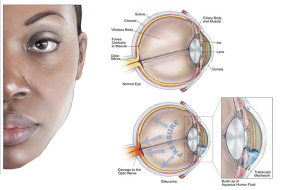What happens as you get older?
It is normal for our eyes to change as we get older. Normal changes include losing the ability to focus on things that are close-up (presbyopia), finding that it takes longer to adapt to changing lighting conditions and finding that we need more light to see things.
As we get older, we are also more likely to develop eye disease. The most common eye diseases in older people are cataracts, age related macular degeneration and glaucoma.
A cataract is where the lens in your eye becomes misty (as though you are looking through a veil or a fogged up window). If you develop cataracts, you will normally get them in both eyes, although one may be worse than the other. Developing cataracts may simply mean that your glasses need changing more often, or that you find bright lights such as sunlight more dazzling than you used to. If the cataracts become bad enough to affect your lifestyle, you can have them removed during a routine operation.
Age-related macular degeneration (AMD) affects your central vision and your ability to see detail. This can make it difficult to read and to recognise faces. There are two types of AMD. The dry type of AMD cannot be treated, but tends to progress slowly. The wet type of AMD can be treated and may progress quickly. Symptoms of AMD include seeing a blurry, blank or distorted patch in or near the centre of your vision. If you notice this you should contact your optometrist straight away.
Glaucoma is when the pressure inside your eye causes damage to the nerve at the back of your eye. It is painless and causes no symptoms in the early stages, so it is important that you have regular eye examinations to make sure that if you have glaucoma it is detected early. You are more at risk of glaucoma if you are aged over 40, very short sighted, of African or Caribbean origin or closely related to someone with glaucoma. If left untreated, glaucoma can lead to tunnel vision and blindness.
For more information on any of these conditions, talk to your optometrist or visit www.lookafteryoureyes.org.
What you can do to try to maintain good eye sight
- Have regular eye examinations. This will allow your optometrist to spot early signs of eye disease, when it is easier to treat. Most people should have an eye examination at least every two years.
- Stop smoking. Smoking has been linked to AMD, which is the leading cause of blindness in the UK. NHS services are available to help you quit. Visit www.smokefree.nhs.uk for more information or call 0800 0224 332.
- Eat a diet that is rich in oily fish and coloured fruit and vegetables and maintain a healthy weight. This may reduce your risk of developing AMD.
- Be aware of your vision in each eye separately. Many conditions appear in one eye first.
If you regularly check your vision (with glasses if you need them) by covering each eye in turn, you are more likely to notice changes. If you notice changes in your vision you should contact your optometrist for advice.
Who is more likely to fall?
There are several reasons why people fall over and not all are related to poor eyesight. You are most at risk of falling if you:
- are aged over 75;
- are a woman;
- have fallen before;
- have Parkinson’s disease, arthritis, diabetes, Meniere’s disease or dementia and/or;
- are taking sedatives, antidepressants or more than four prescription medicines a day.
What you can do to reduce the chance of falling
- Try to keep your eyes healthy (see above).
- Have good lighting. Energy saving bulbs are fine as long as you position them correctly. We recommend having lamps close to where you need the light (for example, a lamp near the chair where you sit to read).
- Make sure you turn the lights on at home when it is dark, so that you can see where you are going.
- Make sure that your carpets are well fitted and do not have trip hazards, such as creases, in them. If you have a rug that is on a slippery floor, make sure that it does not slip or move when you walk on it.
- Wear suitable footwear when you are walking around, both at home and outside.
- Having a good contrast between things can make them easier to see. Examples would be having a dark toilet seat on a white toilet (and a dark bathroom floor if you have a white toilet, sink and so on) and having dark edges on steps or stairs.
- If you are dazzled by the sunshine when you are out, wear sunglasses that absorb the UV light or a hat with a brim to shield you from the sunlight.
- If your optometrist has told you that you should wear glasses for distance (watching television, walking about and so on) you should keep them on when you are walking outside your home.
- If you wear bifocals or varifocals, you may be more likely to fall, even if you are used to them. If you take part in regular outdoor activities, it may be a good idea to have a pair of distance glasses to wear outdoors and when you are in unfamiliar places, or to take your glasses off if your distance prescription is not very strong. Your optometrist will be able to advise you about this.
For more information on looking after your eyes as you get older or to receive a personal eye test please visit http://www.blinkopticians.co.uk/new/personalised-eye-tests-2/.




